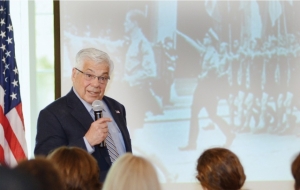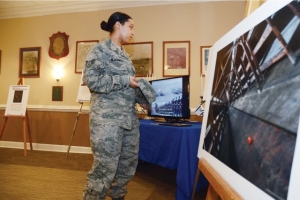Holocaust survivor tells story at Seymour Johnson AFB
By Matt Caulder
Published in News on April 29, 2014 1:46 PM

News-Argus/CASEY MOZINGO
Alfred Schnog speaks to an audience on Seymour Johnson Air Force Base Monday about his experiences growing up in, and escaping from, Nazi Germany. Behind him is a photograph of a Nazi parade.

News-Argus/CASEY MOZINGO
Staff Sgt. Vanessa Blackwell views the video, photos and artifacts in the temporary Holocaust museum at Seymour Johnson Air Force Base Monday.
Alfred Schnog was too young to remember the Nazi Party's rise to power.
He can hardly recall the days before newspapers turned against his people -- when beaches and other public places were closed off to those who shared his faith.
But he will never forget being stripped of his citizenship in a land his family had called home for some 200 years.
And the feeling that accompanies those on the wrong side of segregation lingers within him still.
"Anti-Semitism that had existed in Europe for years had now become government policy," he said. "Back in the beginning, they weren't interested in killing the Jews. They were more interested in getting rid of them. They were trying to give them away."
Schnog spoke to several dozen people Monday at Seymour Johnson Air Force Base as the 4th Fighter Wing marked Holocaust Remembrance Day.
But the man who was forced to, alongside his family, flee Germany during the height of Hitler's ascent doesn't need a holiday to honor those who failed to escape.
He lives with the emotions he experienced during that time every day.
Born in Cologne in 1931, Schnog can still see the weekend parades that unfolded every weekend during his childhood.
"There was music and flags and it looked like fun," he said. "We were told in no uncertain terms that we were not allowed to join that parade. That we were not wanted there."
And he remembers being forced to leave his school and join the Jewish school constructed to house the students who were no longer allowed to learn with Germans.
The image of his father's company being taken over by the Nazis is still imprinted in his mind.
"They took the company and forced everyone to stay on to teach the Nazi's how to run the business," Schnog said.
But the most poignant memories unfolded after the patriarch of his family devised a plan to flee Germany.
It was framed as a business trip, but the Schnogs knew.
"We sent all of our belongings in a truck to Holland. We had no beds in our house so we stayed at the Dom Hotel, over near the cathedral," Schnog said. "We were so excited to be leaving the next day it was hard to get us to bed down to sleep. The street was lined with nice Jewish shops in that area. It seemed like we had only just gotten to sleep when our parents woke us up and brought us to the window. They stood us in between the floor-to-ceiling drapes and the window and we couldn't believe what we saw."
What Schnog saw was Kristalnacht -- the night of broken glass, the night when all across Germany, Jewish shops were ruined by rioters who broke in and destroyed merchandise while the police looked on.
On their way to the border, the Schnog's were detained twice, but made it into Holland.
Schnog, who lives in Wilmington, said that he travels around to different areas telling his family's story so that the mistakes of the past will not be repeated.
"I want to tell people how these things start," he said. "They start with a hate and build."
